According to a recent article from the New York Times: the Vatican‘s chief astronomer says there is no conflict between believing in God and in the possibility of extraterrestrial “brothers” perhaps more evolved than humans.
“In my opinion this possibility exists,” said the Reverend José Gabriel Funes, head of the Vatican Observatory and a scientific adviser to Pope Benedict XVI, referring to life on other planets.
“How can we exclude that life has developed elsewhere,” he said in an interview with the Vatican newspaper L’Osservatore Romano, published in its Tuesday-Wednesday edition. The large number of galaxies with their own planets makes this possible, he noted… More at: http://www.nytimes.com/2008/05/14/world/europe/14iht-vat.4.12885393.html?_r=2
CHRISTIAN’ INTEREST IN UFOS
by Blessed Hieromonk Seraphim Rose
A second example of a new phenomenon, which at first sight one doesn’t know what to make of, is the now very common phenomenon of UFOs, flying saucers.
There is a particular Protestant evangelist, the above-mentioned Carl McIntire, who is extremely strict and righteous and very Bible-believing. He has a radio program, the Twentieth-Century Reformation, and a newspaper. He is absolutely upright—you have to separate from all people who are in apostasy—and his ideas are very nice. He’s anti-communist. He calls Billy Graham an apostate, together with everyone who deviates from the strict line of what he thinks is right. From this point of view he’s very strict, and yet you see the strangest things in his philosophy. For example, he’s building himself the Temple of Jerusalem, in Florida. He has a model of the Temple, and he wants to build it so as to make it compete with Disneyworld. People will come and pay to see the great Temple which is soon going to be built for Christ to come to earth. This is supposed to provide a good opportunity to witness Christianity.
He goes in for the flying saucers, also. In every issue of his newspaper there’s a little column called “UFO Column,” and there they talk, to one’s great astonishment, about all the wonderful, positive things which these flying saucers are doing. The give conferences and make movies about them.
Just recently there have been several Protestant books about UFOs, showing quite clearly that they’re demons. The person who writes the column in this newspaper got upset about this, and said that some people say that these beings are demons, but we can prove they aren’t. He says that maybe a couple of them are demons, but most of them aren’t. He cites a recent case in which some family in the Midwest saw a flying saucer. The flying saucer came down, landed, and the family saw inside little men—they’re usually four and half feet tall or so—and they sang “Hallelujah.” They stopped and looked and then they flew away; I guess they didn’t talk to them any more. And that set the family to thinking; they began to think “Hallelujah”; they began to think about Christianity; they looked in their Bibles, and they finally ended up going to a Fundamentalist church and being converted to Christianity. Therefore, he says, these beings must be some kind of people who are helping God’s plan to make the world Christian because they said “Hallelujah.”
Of course, if you read Bishop Ignatius Brianchaninov, you will know about all the deceptions which the demons perpetrate: the demons “pray” for you, the demons make miracles, they produce the most wonderful phenomena, they bring people to church, they do anything you want, as long as they keep you in this deception. And when the time comes, they will suddenly pull their tricks on you. So these people, who have been converted to some kind of Christianity by these so-called outer-space beings, are waiting for the next time they will come; and the next time their message may have to do with Christ coming to earth again soon, or something of the sort. It’s obvious that this is all the work of demons. That is, where it’s real. Sometimes it’s just imagination, but when it’s real this kind of thing obviously comes form demons.
This is very elementary. If you read any text of the early Fathers, any of the early Lives of Saints or the Lausiac History, you find many cases where beings suddenly appear. Nowadays they appear in spaceships because that’s how the demons have adapted themselves to the people of the times; but if you understand how spiritual deception works and what kind of wiles the devil has, then you have no problems in understanding what’s going on with these flying saucers. And yet this person who writes the UFO column is an absolutely strict Fundamentalist Christian. He is looking, actually for new revelations to come from beings from outer space.
The Spirit of the Last Times
A “Pentecost without Christ”
THE HOLY SCRIPTURES and Orthodox Fathers clearly tell us that the character of the last times will not at all be one of a great spiritual “revival,” of an “outpouring of the Holy Spirit,” but rather one of almost universal apostasy, of spiritual deception so subtle that the very elect, if that were possible, will be deceived, of the virtual disappearance of Christianity from the face of the earth. “When the Son of man cometh, shall He find faith on the earth?” (Luke 18:8) It is precisely in the last times that Satan is to be loosed (Apoc. 20:3) in order to produce the final and greatest outpouring of evil upon the earth.
The “charismatic revival,” the product of a world without sacraments, without grace, a world thirsting for spiritual “signs” without being able to discern the spirits that give the signs, is itself a “sign” of these apostate times. The ecumenical movement itself remains always a movement of “good intentions” and feeble humanitarian “good deeds”; but when it is joined by a movement with “power,” indeed “with all power and signs and lying wonders” (2 Thess. 2:9), then who will be able to stop it? The “charismatic revival” comes to the rescue of a floundering ecumenism, and pushes it on to its goal. And this goal, as we have seen, is not merely “Christian” in nature – the “refounding of the Church of Christ,” to use the blasphemous utterance of Patriarch Athenagoras of Constantinople – that is only the first step to a larger goal which lies entirely outside of Christianity: the establishment of the “spiritual unity” of all religions, of all mankind.
However, the followers of the “charismatic revival” believe their experience is “Christian”; they will have nothing to do with occultism and Eastern religions; and they doubtless reject outright the whole comparison in the preceding pages of the “charismatic revival” with spiritism. Now it is quite true that religiously the “charismatic revival” is on a higher level than spiritism, which is a product of quite gross credulity and superstition; that its techniques are more refined and its phenomena more plentiful and more easily obtained; and that its whole ideology gives the appearance of being “Christian” – not Orthodox, but something that is not far from Protestant fundamentalism with an added “ecumenical” coloring.
Those who bring Christian ideas to the experience assume that the “Baptism in the Holy Spirit” is a Christian experience. But if it can be given to those who merely seek a cheap, easy status experience – then there is no necessary connection whatever between this experience and Christ. The very possibility of an experience of a “Pentecost without Christ” means that the experience in itself is not Christian at all; “Christians,” often sincere and well-meaning, are reading into the experience a Christian content which in itself it does not have.
Do we not have here the common denominator of “spiritual experience” which is needed for a new world religion? Is this not perhaps the key to the “spiritual unity” of mankind which the ecumenical movement has sought in vain?
The “New Christianity”
THERE MAY BE THOSE who will doubt that the “charismatic revival” is a form of mediumism; that is only a secondary question of the means or technique by which the “spirit” of the “charismatic revival” is communicated. But that this “spirit” has nothing to do with Orthodox Christianity is abundantly clear. And in fact this “spirit” follows almost to the letter the “prophecies” of Nicholas Berdyaev concerning a “New Christianity.” It completely leaves behind the “monastic ascetic spirit of historical Orthodoxy,” which most effectively exposes its falsity. It is not satisfied with the “conservative Christianity which directs the spiritual forces of man only towards contrition and salvation,” but rather, apparently believing like Berdyaev that such a Christianity is still “incomplete,” adds a second level of “spiritual” phenomena, not one of which is specifically Christian in character (although one is free to interpret them as “Christian”), which are open to people of every denomination with or without repentance, and which are completely unrelated to salvation. It looks to “a new era in Christianity, a new and deep spirituality, which means a new outpouring of the Holy Spirit” – in complete contradiction of Orthodox tradition and prophecy.
This is truly a “New Christianity” – but the specifically “new” ingredient in this “Christianity” is nothing original or “advanced,” but merely a modern form of the devil’s age – old religion of shamanistic paganism. The Orthodox “charismatic” periodical The Logos recommends Nicholas Berdyaev as a “prophet” precisely because he was “the greatest theologian of spiritual creativeness” (Logos, March, 1972, p. 8). And indeed, it is precisely the shamans of every primitive tribe who know how to get in contact with and utilize the primordial “creative” powers of the universe – those “spirits of earth and sky and sea” which the Church of Christ recognizes as demons, and in serving which it is indeed possible to attain to a “creative” ecstasy and joy (the “Nietzschean enthusiasm and ecstasy” to which Berdyaev felt so close) which are unknown to the weary and half-hearted “Christians” who fall for the “charismatic” deception. But there is no Christ here. God has forbidden contact with this “creative,” occult realm into which “Christians” have stumbled through ignorance and self-deception. The “charismatic revival” will have no need to enter a “dialogue with non-Christian religions,” because, under the name of “Christianity,” it is already embracing non-Christian religion and is itself becoming the new religion which Berdyaev foresaw, strangely combining “Christianity” and paganism.
The strange “Christian” spirit of the “charismatic revival” is clearly identified in the Holy Scriptures and the Orthodox patristic tradition. According to these sources, world history will culminate in an almost superhuman “Christian” figure, the false messiah or antichrist. He will be “Christian” in the sense that his whole function and his very being will center on Christ, Whom he will imitate in every respect possible, and he will be not merely the greatest enemy of Christ, but in order to deceive Christians will appear to be Christ, come to earth for a second time and ruling from the restored Temple in Jerusalem.
Let no one deceive you by any means, for that day shall not come except there come a falling away (apostasy) first, and that man of sin be revealed, the son of perdition, who opposeth and exalteth himself above all that is called God, or that is worshipped; so that he as God sitteth in the temple of God, showing himself that he is God… even him whose coming is after the working of Satan with all lying wonders, and with all deceivableness in them that perish; because they received not the love of the truth, that they might be saved. And for this cause God shall send them strong delusion, that they should believe a lie: that they all might be damned who believed not the truth, but had pleasure in unrighteousness (2 Thess. 2:3-4, 9-12).
The Orthodox teaching concerning antichrist is a large subject in itself and cannot be presented here. But if, as the followers of the “charismatic revival” believe, the last days are indeed at hand, it is of crucial importance for the Orthodox Christian to be informed of this teaching concerning one who, as the Saviour Himself has told us, together with the “false prophets” of that time, shall show great signs and wonders, insomuch that, if it were possible, they shall deceive the very elect (Matt. 24:24). And the “elect” are certainly not those multitudes of people who are coming to accept the gross and most unscriptural delusion that “the world is on the threshold of a great spiritual awakening,” but rather the “little flock” to which alone our Saviour has promised: It is your Father’s good pleasure to give you the Kingdom (Luke 12:32). Even the true “elect” will be sorely tempted by the “great signs and wonders” of antichrist; but most “Christians” will accept him without any question, for his “New Christianity” is precisely what they seek.
“Little Children, It is the Last Hour” (1 John 2:18)
Outside of genuine Orthodoxy the darkness… grows. Judging from the latest “religious” news, the “charismatic revival” may well be only the faint beginning of a whole “age of miracles.” Many Protestants who have discerned the fraud of the “charismatic revival” now accept as “the real thing” the spectacular “revival” in Indonesia where, we are told, there are really occurring “the self same things that one finds reported in the Acts of the Apostles.” In the space of three years 200,000 pagans have been converted to Protestantism under constantly miraculous conditions: No one does anything except in absolute obedience to “voices” and “angels” who are constantly appearing, usually quoting Scripture by number and verse; water is turned into wine every time the Protestant communion service comes around; detached hands appear from nowhere to distribute miraculous food to the hungry; a whole band of demons is seen to abandon a pagan village because a “more powerful” one (“Jesus”) has come to take their place; “Christians” have a “countdown” for an unrepentant sinner, and when they come to “zero” he dies; children are taught new Protestant hymns by voices that come from nowhere (and repeat the song twenty times so the children will remember); “God’s tape-recorder” records the song of a children¹s choir and plays it back in the air for the astonished children; fire comes down from the sky to consume Catholic religious images (“the Lord” in Indonesia is very anti-Catholic); 30,000 have been healed; “Christ” appears in the sky and “falls” on people in order to heal them; people are miraculously transported from place to place and walk on water; lights accompany evangelists and guide them at night, and clouds follow them and give them shelter during the day: the dead are raised [19].
Interestingly, in some parts of the Indonesian “revival” the element of “speaking in tongues” is almost totally absent and is even forbidden (although it is present in many places), and the element of mediumism seems sometimes to be replaced by a direct intervention of fallen spirits. It may well be that this new “revival,” more powerful than Pentecostalism, is a more developed stage of the same “spiritual” phenomenon (just as Pentecostalism itself is more advanced than spiritism) and heralds the imminence of the dreadful day when, as the “voices” and “angels” in Indonesia also proclaim, “the Lord” is to come – for we know that antichrist will prove to the world that he is “Christ” by just such “miracles.”
In an age of almost universal darkness and deception, when for most “Christians” Christ has become precisely what Orthodox teaching means by antichrist, the Orthodox Church of Christ alone possesses and communicates the grace of God. This is a priceless treasure the very existence of which is not so much as suspected even by the “Christian” world. The “Christian” world, indeed, joins hands with the forces of darkness in order to seduce the faithful of the Church of Christ, blindly trusting that the “name of Jesus” will save them even in their apostasy and blasphemy, mindless of the fearful warning of the Lord: “Many will say to Me in that day, Lord, Lord, have we not prophesied in Thy name? and in Thy name have cast out devils? and in Thy name done many wonderful works? And then will I profess unto them, I never knew you: depart from Me, ye that work iniquity” (Matt. 7:22-23).
St. Paul continues his warning about the coming of antichrist with this command: “Therefore, brethren, stand fast, and hold the traditions which ye have been taught, whether by word, or our epistle” (2 Thess. 2:15). “There be some that trouble you, and would pervert the Gospel of Christ. But though we, or an angel from heaven, preach any other gospel unto you than that which we have preached unto you, let him be anathema. As we said before, so say I now again: If any preach any other gospel unto you than that ye have received, let him be anathema” (Gal. 1:8-9).
The Orthodox answer to every new “revival,” and even to the final terrible “revival” of antichrist, is this Gospel of Christ, which the Orthodox Church alone has preserved unchanged in an unbroken line from Christ and His Apostles, and the grace of the Holy Spirit which the Orthodox Church alone communicates, and only to her faithful children, who have received in Chrismation, and kept, the true seal of the gift of the Holy Spirit. Amen.
The Religion of the Future
IT IS DEEPLY INDICATIVE of the spiritual state of contemporary mankind that the “charismatic” and “meditation” experiences are taking root among “Christians.” An Eastern religious influence is undeniably at work in such “Christians,” but it is only as a result of something much more fundamental: the loss of the very feeling and savor of Christianity, due to which something so alien to Christianity as Eastern “meditation” can take hold of “Christian” souls.
The life of self-centeredness and self-satisfaction lived by most of today’s “Christians” is so all-pervading that it effectively seals them off from any understanding at all of spiritual life; and when such people do undertake “spiritual life,” it is only as another form of self-satisfaction. This can be seen quite clearly in the totally false religious ideal both of the “charismatic” movement and the various forms of “Christian meditation”: all of them promise (and give very quickly) an experience of “contentment” and “peace.” But this is not the Christian ideal at all, which if anything may be summed up as a fierce battle and struggle. The “contentment” and “peace” described in these contemporary “spiritual” movements are quite manifestly the product of spiritual deception, of spiritual self-satisfaction – which is the absolute death of the God-oriented spiritual life. All these forms of “Christian meditation” operate solely on the psychic level and have nothing whatever in common with Christian spirituality. Christian spirituality is formed in the arduous struggle to acquire the eternal Kingdom of Heaven, which fully begins only with the dissolution of this temporal world, and the true Christian struggler never finds repose even in the foretastes of eternal blessedness which might be vouchsafed to him in this life; but the Eastern religions, to which the Kingdom of Heaven has not been revealed, strive only to acquire psychic states which begin and end in this life.
In our age of apostasy preceding the manifestation of antichrist, the devil has been loosed for a time (Apoc. 20:7) to work the false miracles which he could not work during the “thousand years” of Grace in the Church of Christ (Apoc. 20:3), and to gather in his hellish harvest of those souls who “received not the love of the truth” (2 Thess. 2:10). We can tell that the time of antichrist is truly near by the very fact that this satanic harvest is now being reaped not merely among the pagan peoples, who have not heard of Christ, but even more among “Christians” who have lost the savor of Christianity. It is of the very nature of antichrist to present the kingdom of the devil as if it were of Christ. The present-day “charismatic” movement and “Christian meditation,” and the “new religious consciousness” of which they are part, are forerunners of the religion of the future, the religion of the last humanity, the religion of antichrist, and their chief “spiritual” function is to make available to Christians the demonic initiation hitherto restricted to the pagan world. Let it be that these “religious experiments” are still often of a tentative and groping nature, that there is in them at least as much psychic self-deception as there is a genuinely demonic initiation rite; doubtless not everyone who has successfully “meditated” or thinks he has received the “Baptism of the Spirit” has actually received initiation into the kingdom of satan. But this is the aim of these “experiments,” and doubtless the techniques of initiation will become ever more efficient as mankind becomes prepared for them by the attitudes or passivity and openness to new “religious experiences” which are inculcated by these movements.
What has brought humanity – and indeed “Christendom” – to this desperate state? Certainly it is not any overt worship of the devil, which is limited always to a few people; rather, it is something much more subtle, and something fearful for a conscious Orthodox Christian to reflect on: it is the loss of the grace of God, which follows on the loss of the savor of Christianity.
Roman Catholics and Protestants today have not fully tasted of God’s grace, and so it is not surprising that they should be unable to discern its demonic counterfeit. But alas! The success of counterfeit spirituality even among Orthodox Christians today reveals how much they also have lost the savor of Christianity and so can no longer distinguish between true Christianity and pseudo-Christianity. For too long have Orthodox Christians taken for granted the precious treasure of their Faith and neglected to put into use the pure gold of its teachings. How many Orthodox Christians even know of the existence of the basic texts of Orthodox spiritual life, which teach precisely how to distinguish between genuine and counterfeit spirituality, texts which give the life and teaching of holy men and women who attained an abundant measure of God’s grace in this life? How many have made their own the teaching of the Lausiac History, the Ladder of St. John, the Homilies of St. Macarius, the Lives of the God-bearing Fathers of the desert, Unseen Warfare, St. John of Kronstadt’s My Life in Christ?
In the Life of the great Father of the Egyptian desert, St. Paisius the Great (June 19), we may see a shocking example of how easy it is to lose the grace of God. Once a disciple of his was walking to a city in Egypt to sell his handiwork. On the way he met a Jew who, seeing his simplicity, began to deceive him, saying: “O beloved, why do you believe in a simple, crucified Man, when He was not at all the awaited Messiah? Another is to come, but not He.” The disciple, being weak in mind and simple in heart, began to listen to these words and allowed himself to say: “Perhaps what you say is correct.” When he returned to the desert, St. Paisius turned away from him and would not speak a single word to him. Finally, after the disciple¹s long entreaty, the Saint said to him: “Who are you? I do not know you. This disciple of mine was a Christian and had upon him the grace of Baptism, but you are not such a one; if you are actually my disciple, then the grace of Baptism has left you and the image of a Christian has been removed.” The disciple with tears related his conversation with the Jew, to which the Saint replied: “O wretched one! What could be worse and more foul than such words, by which you renounced Christ and His divine Baptism? Now go and weep over yourself as you wish, for you have no place with me; your name is written with those who have renounced Christ, and together with them you will receive judgment and torments.” On hearing this judgment the disciple was filled with repentance, and at his entreaty the Saint shut himself up and prayed to the Lord to forgive his disciple this sin. The Lord heard the Saint¹s prayer and granted him to behold a sign of His forgiveness of the disciple. The Saint then warned the disciple: “O child, give glory and thanksgiving to Christ God together with me, for the unclean, blasphemous spirit has departed from you, and in his place the Holy Spirit has descended upon you, restoring to you the grace of Baptism. And so, guard yourself now, lest out of sloth and carelessness the nets of the enemy should fall upon you again and, having sinned, you should inherit the fire of gehenna.”
Significantly, it is among “ecumenical Christians” that the “charismatic” and “meditation” movements have taken root. The characteristic belief of the heresy of ecumenism is this: that the Orthodox Church is not the one true Church of Christ; that the grace of God is present also in other “Christian” denominations, and even in non-Christian religions; that the narrow path of salvation according to the teaching of the Holy Fathers of the Orthodox Church is only “one path among many” to salvation; and that the details of one’s belief in Christ are of little importance, as is one’s membership in any particular church. Not all the Orthodox participants in the ecumenical movement believe this entirely (although Protestants and Roman Catholics most certainly do); but by their very participation in this movement, including invariably common prayer with those who believe wrongly about Christ and His Church, they tell the heretics who behold them: “Perhaps what you say is correct,” even as the wretched disciple of St. Paisius did. No more than this is required for an Orthodox Christian to lose the grace of God; and what labor it will cost for him to gain it back!
How much, then, must Orthodox Christians walk in the fear of God, trembling lest they lose His grace, which by no means is given to everyone, but only to those who hold the true Faith, lead a life of Christian struggle, and treasure the grace of God which leads them heavenward. And how much more cautiously must Orthodox Christians walk today above all, when they are surrounded by a counterfeit Christianity that gives its own experiences of “grace” and the “Holy Spirit” and can abundantly quote the Scriptures and the Holy Fathers to “prove” it! Surely the last times are near, when there will come spiritual deception so persuasive as to “deceive, if it were possible, even the very elect” (Matt. 24:24).
Orthodox Christians! Hold fast to the grace which you have; never let it become a matter of habit; never measure it by merely human standards or expect it to be logical or comprehensible to those who understand nothing higher than what is human or who think to obtain the grace of the Holy Spirit in some other way than that which the one Church of Christ has handed down to us. True Orthodoxy by its very nature must seem totally out of place in these demonic times, a dwindling minority of the despised and “foolish,” in the midst of a religious “revival” inspired by another kind of spirit. But let us take comfort from the certain words of our Lord Jesus Christ: “Fear not, little flock, for it is your Fathers good pleasure to give you the Kingdom” (Luke 12:32).
Let all true Orthodox Christians strengthen themselves for the battle ahead, never forgetting that in Christ the victory is already ours. He has promised that the gates of hell will not prevail against His Church (Matt. 16:18), and that for the sake of the elect He will cut short the days of the last great tribulation (Matt. 24:22). And in truth, “If God be for us, who can be against us?” (Rom. 8:31). Even in the midst of the cruelest temptations, we are commanded to be of good cheer; I have overcome the world (John 16:33). Let us live, even as true Christians of all times have lived, in expectation of the end of all things and the coming of our dear Saviour; for “He that giveth testimony of these things saith: Surely I come quickly. Amen. Come, Lord Jesus” (Apoc. 22:20).
______________________________________________
Excerpts from “Orthodoxy and the Religion of the Future” by blessed Father Seraphim Rose @ St. Herman of Alaska Brotherhood, Platina, California, 2004.







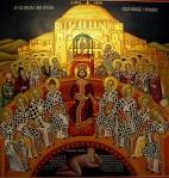 Christian Dogma
Christian Dogma Christian Martyrs
Christian Martyrs Christian Orthodox Churches and Monasteries
Christian Orthodox Churches and Monasteries Christian Sermons and News
Christian Sermons and News Church's Teachings on Fasting
Church's Teachings on Fasting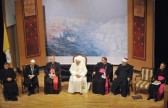 Ecumenism – a Great Heresy
Ecumenism – a Great Heresy Father George Calciu
Father George Calciu Life_a Sacred Gift form God
Life_a Sacred Gift form God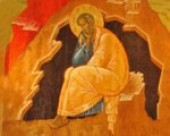 Orthodox Saints and Church Fathers
Orthodox Saints and Church Fathers Spiritual Elders
Spiritual Elders Daily Bible Readings
Daily Bible Readings Journey to Orthodoxy
Journey to Orthodoxy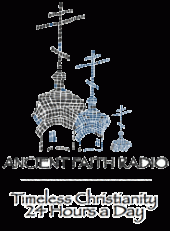 Listen to Ancient Faith Radio
Listen to Ancient Faith Radio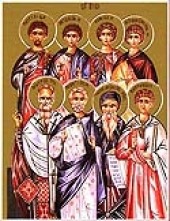 Orthodox Calendar of Feasts and Saints
Orthodox Calendar of Feasts and Saints Orthodox Christian Mission Center
Orthodox Christian Mission Center Orthodox Institute
Orthodox Institute OrthodoxChristianNetwork TV
OrthodoxChristianNetwork TV
1 comment
Comments feed for this article
April 29, 2010 at 11:19 AM
Tweets that mention Vatican astronomer cites possibility of extraterrestrial ‘brothers’… Why Christians are so interested in UFOS? « OrthodoxWord -- Topsy.com
[…] This post was mentioned on Twitter by UFO Jim. UFO Jim said: Vatican astronomer cites possibility of extraterrestrial 'brothers …: According to a recent article from the New… http://bit.ly/b0Pwqf […]